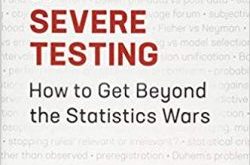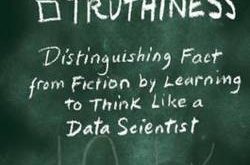Hidden Markov Models and Bayes Theorem for dummies [embedded content]
Read More »Beyond probabilism
“Getting philosophical” is not about articulating rarified concepts divorced from statistical practice. It is to provide tools to avoid obfuscating the terms and issues being bandied about … Do I hear a protest? “There is nothing philosophical about our criticism of statistical significance tests (someone might say). The problem is that a small P-value is invariably, and erroneously, interpreted as giving a small probability to the null hypothesis.” Really? P-values are not...
Read More »On the emptiness of Bayesian probabilism
On the emptiness of Bayesian probabilism A major attraction of the personalistic [Bayesian] view is that it aims to address uncertainty that is not directly based on statistical data, in the narrow sense of that term. Clearly much uncertainty is of this broader kind. Yet when we come to specific issues I believe that a snag in the theory emerges. To take an example that concerns me at the moment: what is the evidence that the signals from mobile...
Read More »Keynes on the limits of econometric methods
Keynes on the limits of econometric methods Am I right in thinking that the method of multiple correlation analysis essentially depends on the economist having furnished, not merely a list of the significant causes, which is correct so far as it goes, but a complete list? For example, suppose three factors are taken into account, it is not enough that these should be in fact vera causa; there must be no other significant factor. If there is a further...
Read More »Insignificant ‘statistical significance’
We recommend dropping the NHST [null hypothesis significance testing] paradigm — and the p-value thresholds associated with it — as the default statistical paradigm for research, publication, and discovery in the biomedical and social sciences. Specifically, rather than allowing statistical signicance as determined by p < 0.05 (or some other statistical threshold) to serve as a lexicographic decision rule in scientic publication and statistical decision making more broadly...
Read More »Handy missing data methodologies
Handy missing data methodologies On October 13, 2012, Manny Fernandez reported in The New York Times that former El Paso schools superintendent Lorenzo Garcia was sentenced to prison for his role in orchestrating a testing scandal. The Texas Assessment of Knowledge and Skills (TAKS) is a state-mandated test for high-school sophomores. The TAKS missing data algorithm was to treat missing data as missing-at-random, and hence the score for the entire school...
Read More »Parachutes do not reduce death when jumping from aircraft
Parachutes do not reduce death when jumping from aircraft Parachute use compared with a backpack control did not reduce death or major traumatic injury when used by participants jumping from aircraft in this first randomized evaluation of the intervention. This largely resulted from our ability to only recruit participants jumping from stationary aircraft on the ground. When beliefs regarding the effectiveness of an intervention exist in the community,...
Read More »The replicability crisis
[embedded content]
Read More »Statistics is no substitute for thinking
Statistics is no substitute for thinking The cost of computing has dropped exponentially, but the cost of thinking is what it always was. That is why we see so many articles with so many regressions and so little thought. Zvi Griliches
Read More »Confessions of scientific fraud
Confessions of scientific fraud Even with my various “grey” methods for “improving” the data, I wasn’t able to get the results the way I wanted them. I couldn’t resist the temptation to go a step further. I wanted it so badly … I opened the file with the data that I had entered and changed an unexpected 2 into a 4; then, a little further along, I changed a 3 into a 5. It didn’t feel right. I looked around me nervously. The data danced in front of my eyes....
Read More » Heterodox
Heterodox








